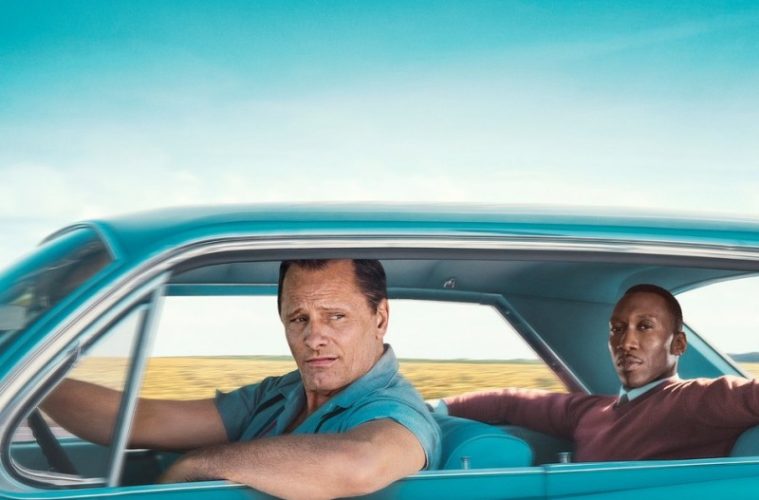“For a vacation without aggravation.” So begins The Green Book, a guide for black travelers of the limited establishments they were welcome at in a segregated America. Published in the decades leading up to the Civil Rights Act of 1964 (and a few years beyond), the handbook could be considered more valuable than a Bible for its intended readers as they navigate to safe passage amongst a cesspool of racism. In Peter Farrelly’s entertaining, easy-to-please dramedy Green Book, it’s the first thing given to Tony “Lip” Vallelonga (Viggo Mortensen), who reluctantly accepted a two-month gig to drive renowned pianist Don Shirley (Mahershala Ali) on a concert tour through the Deep South.
Packing the kind of Italian-bred gut that can hold 26 hot dogs in one sitting and, for dinner, an entire pizza (folded in half calzone-style, in the film’s best sight gag), Mortensen plays Tony Lip with a wallop of brash endearment. A self-proclaimed “bullshit artist,” he can convince anyone to do anything, whether through genial wordplay or a punch to the face–which made him the perfect driver and itinerary keeper for Shirley, whose trip down south will be met with no shortage of prejudiced opposition.

Suave and intelligent, yet isolated from popular black culture, Shirley has never heard a song from Aretha Franklin, Sam Cooke, or Little Richard, but he can play Chopin and Beethoven well enough to be a friend to President Kennedy. Whereas Mortensen is playing an amusing caricature, Ali is the mysterious soul of the film, portraying an unwavering stoicism in the face of each obstacle he encounters. These hurdles range from Tony Lip’s good-natured, but no less incessant badgering to more destructive oppression, another layer of which is revealed when it comes to Don Shirley’s sexuality. Shirley is a man not fully accepted into the upper-class echelon that his talent has invited him into, nor does he fully feel part of the fight amongst his fellow African Americans to attain proper civil rights, and Ali plays this struggle with subtle, potent emotional weight.
Telegraphed from when Tony’s foot first hits the pedal, it’s clear to see what these two men will learn from each other and the obstacles they’ll face along the way. Tony’s uneducated, rough-and-tumble exterior gives way to some linguistic improvement, a penchant for penmanship, and a new understanding for the racial struggles Shirley faces. Thanks to Tony’s constant coaxing, Shirley is able to let loose ever so slightly from his isolated life, despite the race-fueled violence and restrictions at every turn. The bigotry on display is unfortunately portrayed with a simplistic, coddled view and Farrelly is too keen to make sure no moment gets too complex or serious, opting in most moments to play into audience amusement. As the two trade one-liner lessons like “the world is full of lonely people afraid to make the first move” and “dignity always prevails,” Farrelly is not interested in unpacking anything more compelling behind these surface-level idioms.
A misguided scene in which Tony attempts to teach Shirley about his culture by imposing he partake in a bucket of KFC will no doubt be hung out to dry by Film Twitter in a manner which hasn’t been seen since the re-appraisal of Three Billboards Outside Ebbing, Missouri. Even if these missteps can be chalked up to the early rough patches of Vallelonga’s transformative arc, his character never fully rises out of a cartoonish mold. This is the kind of film that aims to heal the racial divide, yet throws in a derogatory remark at an Asian character to earn a punchline.

In a film that features assaults from rednecks and police brutality (followed by a short-sighted Not All Cops moment that solidifies Farrelly’s non-confrontational viewpoint), it’s telling how superficial those observations are rendered that the saddest, most suffocating image involves Ali’s character utterly alone on what should be a joyous night. In fact, it’s a final shot that would have been an emotional gut punch, but Farrelly is telling a heart-warming, comical buddy story first and foremost, and Green Book, for better or worse, feels more like a wholehearted familial embrace than a treatise on the state of race in America today.
Much has already been discussed that this is Farrelly’s first foray into drama, but when it comes to transplanting the crowd-pleasing desires found in his comedies into a more dramatic mode, the transition is not only seamless, but fairly obvious when looking at the final product. For his entire career, Farrelly’s end goal has been to delight his audience. Green Book is no different. As is intended, many will walk out feeling rightly warmed in spending time watching Tony and Don’s burgeoning friendship. If one triumphantly exits the theater feeling emboldened that they got their lesson on race relations for the year, then there is something far more alarming at hand.
Green Book opens in limited release on November 16 and expands wide next week.

